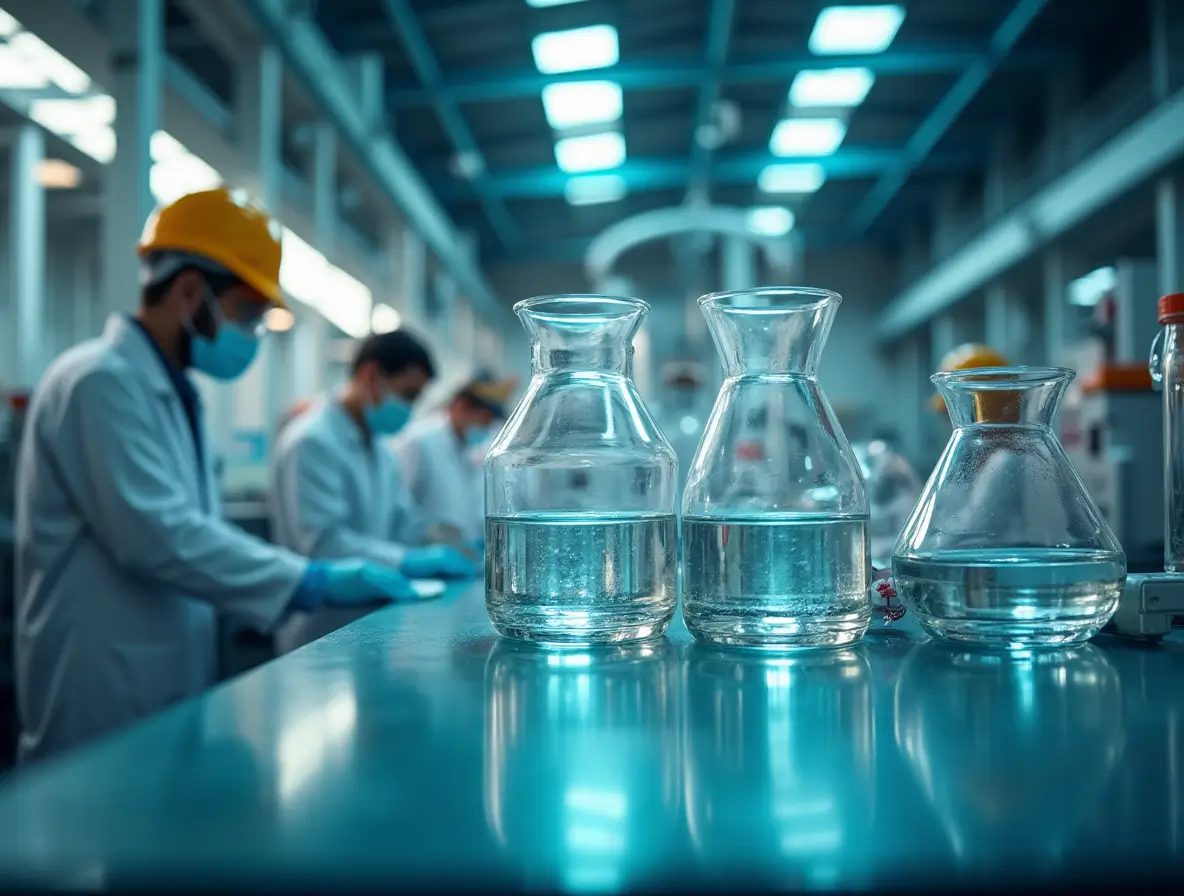Importance of Balancing Cost and Quality in Regenerated MMA Suppliers
When evaluating regenerated MMA (methyl methacrylate) monomer suppliers, focusing exclusively on cost can undermine long-term performance and reliability. MMA monomers play a critical role in various industries, and subpar quality can result in compromised product durability, operational inefficiencies, and increased expenses over time. High-quality regenerated MMA ensures the consistency of chemical properties, which directly impacts end-product performance. Conversely, excessive spending without assessing quality value can lead to unnecessary budget strain.
Key Factors to Consider:
- Material Purity: Ensures accurate polymerization reactions and homogeneous product outcomes.
- Price vs. Performance Analysis: Assess lifecycle cost effectiveness instead of upfront cost alone.
- Supplier Reliability: A blend of affordability with proven track records validates trustworthiness.
Balancing both aspects allows businesses to achieve optimal operational efficiency and sustainable production goals.
What is Regenerated MMA and Why Does It Matter?
Regenerated Methyl Methacrylate (MMA) refers to MMA monomer recovered from waste PMMA (Polymethyl Methacrylate) products through chemical recycling processes. These processes break down end-of-life PMMA into its original monomer form, which can then be reintroduced into production cycles. The regeneration of MMA reduces dependency on virgin raw materials, promoting sustainable practices within industries reliant on acrylic products.
The importance of regenerated MMA lies in its environmental and economic benefits. It supports a circular economy by minimizing landfill waste, lowering carbon emissions, and conserving resources. Additionally, regenerated MMA exhibits comparable purity and performance to virgin MMA, making it a viable alternative for various applications like automotive, construction, and signage production.
Key Factors to Consider When Evaluating Supplier Quality
Evaluating the quality of a regenerated MMA monomer supplier involves several critical considerations to ensure product reliability and consistency.
- Material Purity: Assess the supplier’s ability to deliver high-purity regenerated MMA monomer. This directly impacts end-product performance across applications. Purity certificates or third-party testing results provide essential insights.
- Certifications and Compliance: Verify adherence to industry standards such as ISO certifications, REACH compliance, or other relevant regulatory benchmarks. This ensures the supplier meets established safety and quality norms.
- Production Consistency: Evaluate their manufacturing processes for stability and consistency. A dependable supplier maintains uniform quality across batches with minimal variations.
- Technical Support: Consider whether the supplier offers technical guidance. A knowledgeable team signals their expertise and willingness to address technical challenges.
- Supply Chain Reliability: Examine lead times, logistics capabilities, and history of meeting deadlines without disrupting operations. Consistent delivery is vital for production schedules.
These factors collectively define supplier quality and impact long-term partnerships.
Hidden Costs of Choosing the Cheapest Option
Selecting a supplier based solely on price may appear cost-effective initially, but it can generate unforeseen expenses. Low-cost regenerated MMA monomers often compromise on quality, leading to inconsistent product performance and potential operational disruptions. Inferior purity levels may cause contamination, increasing the risk of defective outputs and costly recalls. Furthermore, suppliers offering unrealistically low prices may lack robust customer support or technical expertise, leading to time-consuming troubleshooting or delayed assistance.
Discounted pricing may also mask hidden fees, such as transportation or packaging charges, which impact the overall cost. It is essential to evaluate value holistically to avoid detrimental consequences long-term.
How to Assess Product Quality in Regenerated MMA
Evaluating the quality of regenerated MMA monomer involves several crucial factors that ensure its consistency and performance in various applications. Buyers should prioritize laboratory testing alongside visual inspections to determine purity levels and identify impurities.
Key Methods for Quality Assessment:
- Purity Analysis: Testing methods such as gas chromatography can verify the monomer’s chemical composition and ensure compliance with industry standards.
- Color and Clarity: Visual inspections for clarity and absence of color impurities provide initial insights into the product’s refining process.
- Stability Testing: Assessment of thermal and storage stability helps predict the longevity of regenerated MMA in demanding conditions.
- Supplier Certifications: Verifying certifications such as ISO standards guarantees adherence to quality controls.
A detailed review of technical datasheets and batch records further delivers critical transparency for the buyer’s assurance.
The Role of Certifications and Standards in Supplier Selection
Certifications and standards serve as critical benchmarks in evaluating potential suppliers of regenerated MMA monomers. They ensure compliance with industry-specific regulations, environmental protocols, and product quality expectations. Certifications such as ISO 9001 for quality management systems or ISO 14001 for environmental management demonstrate a supplier’s commitment to operational excellence and sustainability.
When assessing suppliers, priority should be given to those who adhere to REACH (Registration, Evaluation, Authorization, and Restriction of Chemicals) and RoHS (Restriction of Hazardous Substances) compliance, guaranteeing safe and environmentally responsible production practices.
Ensuring the supplier’s adherence to globally recognized standards minimizes risks related to product quality, regulatory litigation, and supply chain interruptions.
Evaluating Supplier Reliability and Consistency
Assessing supplier reliability requires scrutiny of their operational history and market reputation. A dependable regenerated MMA monomer supplier consistently meets quality standards and delivery timelines. Potential buyers should investigate a supplier’s track record, considering customer testimonials and case studies as credible sources of insight.
Supply chain stability is critical; disruptions can cause production delays. Vendors with diversified sourcing strategies and robust logistics networks often ensure smoother operations. Moreover, evaluating certifications, compliance with industry standards, and transparency in practices bolsters trust.
Clear and responsive communication further signals consistency, enabling long-term partnerships that align with manufacturing goals and timelines.
Understanding the Pros and Cons of Local vs Global Suppliers
When selecting regenerated MMA monomer suppliers, evaluating local and global options is crucial. Each has distinct advantages and challenges that influence supply chain decisions.
Advantages of Local Suppliers:
- Shorter lead times due to proximity.
- Easier communication owing to aligned time zones and language.
- Reduced shipping costs and carbon footprint.
- Better support for local economies and compliance with region-specific regulations.
Benefits of Global Suppliers:
- Access to competitive pricing through larger production volumes.
- Greater variety and advanced technologies stemming from diversified industries.
- Scalability for large-scale operations.
Challenges with Each Option:
- Local suppliers may have limited production capacity and higher costs.
- Global suppliers can present logistical hurdles, longer lead times, and elevated shipping risks.
Negotiating Pricing Without Compromising Quality
When evaluating pricing for regenerated MMA monomer suppliers, buyers must focus on achieving a balance between cost-effectiveness and maintaining product quality standards. Prioritizing suppliers who provide transparent pricing structures is critical, as it helps ensure buyers understand exactly what they are paying for.
To negotiate effectively, buyers should consider factors such as bulk purchase discounts, long-term contracts, or flexible payment terms, aligning them with production budgets. Additionally, requests for certifications or test reports on product quality can help verify whether the supplier meets industry standards.
A calculated approach, combined with detailed communication, ensures pricing agreements support both operational goals and quality assurance requirements.
Long-Term Value: Choosing Suppliers for a Sustainable Partnership
Selecting a supplier for regenerated MMA (methyl methacrylate) monomer requires evaluating their potential for long-term collaboration. Key considerations include consistency in product quality and adherence to stringent environmental standards. Suppliers must demonstrate a commitment to sustainability, transparency in operations, and robust business ethics.
Building a sustainable partnership involves analyzing factors such as:
- Proven manufacturing capabilities that meet or exceed industry benchmarks.
- Supply chain reliability ensuring uninterrupted availability.
- Commitment to innovation for continuous improvement.
- Compatibility with shared values, particularly regarding sustainable practices.
Additionally, effective communication channels and flexibility in meeting dynamic requirements strengthen mutual trust, ensuring stability in unforeseen market conditions.
Customer Reviews and Testimonials: Insights into Supplier Performance
Customer reviews and testimonials serve as vital tools for assessing the reliability of regenerated MMA monomer suppliers. They offer firsthand perspectives on supplier performance, highlighting key aspects such as product quality, delivery timelines, and customer support responsiveness.
When analyzing reviews, buyers should identify recurring themes or patterns. Positive indicators often include consistent praise for high-purity monomers, adherence to promised delivery schedules, and proactive communication. Conversely, frequent complaints about product inconsistencies or delayed shipments should prompt caution.
Verified testimonials, specifically from reputable industry stakeholders, can provide additional confidence in a supplier’s capabilities. Engaging directly with past clients for insights also ensures a comprehensive evaluation of the supplier’s track record.
Leveraging Industry Expertise to Make an Informed Decision
When evaluating regenerated MMA monomer suppliers, relying on industry expertise can streamline the decision-making process. Engaging insights from seasoned professionals or third-party advisors helps buyers assess a supplier’s technical capabilities, production processes, and quality standards. Industry experts often offer a deeper understanding of key performance metrics such as monomer purity, traceability, and environmental compliance.
Buyers should also consider input from trade associations, technical journals, or independent certifications to validate suppliers’ claims. Collaborating with experts facilitates accurate comparisons, ensures alignment with regulatory standards, and mitigates risks in procurement. Leveraging such expertise empowers buyers to select suppliers strategically and confidently.
Lessons Learned: Common Pitfalls to Avoid When Selecting Suppliers
When selecting regenerated MMA monomer suppliers, buyers often overlook crucial factors that can lead to costly errors or project delays. Failure to conduct thorough background checks on the supplier’s reputation may result in partnerships with businesses that lack transparency or consistent performance.
Common Pitfalls to Avoid
- Ignoring Certifications: Suppliers without proper certifications might compromise product quality and safety standards. Buyers must verify compliance with industry regulations.
- Unclear Communication Channels: Inefficient communication causes misunderstandings regarding delivery timelines, product specifications, and support.
- Overlooking Sustainability Practices: Buyers should prioritize suppliers valuing environmental responsibility to align with long-term corporate goals.
- Neglecting Scalability Needs: Supplier capacity to meet growing demands is vital for ensuring consistent supply during business expansion.
- Focusing Solely on Price: Prioritizing low-cost options over reliability or quality can lead to inferior materials, performance issues, or higher overall operational costs.
Future Trends in Regenerated MMA Supply Chain Management
The supply chain for regenerated methyl methacrylate (rMMA) is poised for significant advancements driven by sustainability and digital transformation. Emerging trends reflect a stronger focus on leveraging green technologies to minimize environmental impact while increasing operational efficiency.
- Blockchain Integration: Transparency and traceability are set to improve with blockchain technology, enabling detailed tracking from raw material sourcing to final product delivery.
- AI-Powered Demand Forecasting: Artificial intelligence is expected to refine inventory management by predicting demand patterns with greater accuracy.
- Circular Economy Practices: Enhanced recycling solutions will likely lead to a closed-loop supply chain, reducing dependence on virgin materials.
- IoT Adoption: Internet of Things (IoT) devices are anticipated to optimize logistics by real-time monitoring of material conditions and transit times.
These innovations are geared toward fostering resilience, sustainability, and cost-effectiveness across the rMMA supply chain.
Final Thoughts: Achieving the Perfect Balance of Cost and Quality
Securing the ideal regenerated MMA monomer supplier requires a thoughtful evaluation of both cost and quality. Buyers should assess suppliers based on critical factors, including production consistency, material purity, and adherence to industry standards, ensuring that quality expectations align with the intended application.
To achieve a cost-quality balance:
- Compare pricing structures against the durability and performance of the supplied monomers.
- Consider long-term savings from high-quality products that minimize wastage or rework costs.
- Negotiate transparent pricing to avoid hidden fees.
By focusing on value over price alone and tailoring decisions to operational needs, buyers can establish sustainable, mutually beneficial supplier relationships.




